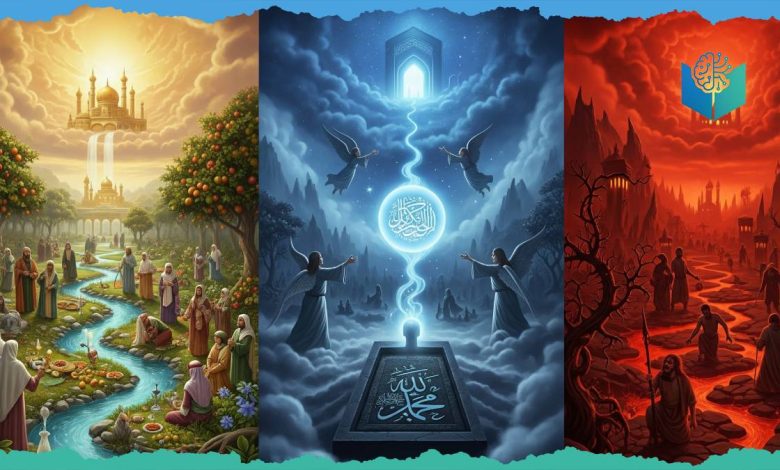The Afterlife in Islam

The concept of the afterlife in Islam is central to the faith. Muslims believe that life on Earth is temporary, and the true, eternal life begins after death. Understanding Heaven and Hell in Islam, as well as the journey of the soul in Islam, helps believers live purposefully, following Allah’s guidance and preparing for accountability. This article explores the stages of life after death, the rewards of paradise, the consequences of sin, and insights from Islamic eschatology as described in the Quran.
Life After Death in Islam
In Islam, life does not end with death. The Quran repeatedly reminds us that the world is temporary and that every soul will be accountable for its deeds:
“Every soul will taste death, and you will only be given your [full] compensation on the Day of Resurrection.” (Quran 3:185)
This verse establishes that the journey of the soul in Islam is inevitable and that preparation through righteous deeds is essential. Learning about Islam helps believers understand the spiritual significance of this transition.
The Journey of the Soul After Death
The journey of the soul begins immediately after death. According to the Quran, the soul enters a stage called Barzakh, a barrier between the worldly life and the Day of Judgment:
“Until, when death comes to one of them, he says, ‘My Lord, send me back that I might do righteousness in that which I left behind.’ No! It is only a word he speaks, and behind them is a barrier until the Day they are resurrected.” (Quran 23:99-100)
This intermediate state emphasizes reflection and accountability. Understanding the journey of the soul in Islam encourages believers to live a life of faith, good deeds, and mindfulness.
The Day of Judgment
The Day of Judgment is a central concept in Islamic eschatology. On this day, all humans will be resurrected and judged for their actions:
“So whoever does an atom’s weight of good will see it, and whoever does an atom’s weight of evil will see it.” (Quran 99:7-8)
The fairness and precision of Allah’s judgment highlight the importance of ethical living. Those seeking to understand Islam find that the Quran provides detailed guidance on how to prepare for this day through righteousness and piety.
Heaven and Hell in Islam
The Quran describes both rewards and punishments vividly to remind believers of the consequences of their actions.

Heaven (Jannah)
Paradise is depicted as a place of eternal bliss, peace, and reward for the faithful:
“Indeed, those who have believed and done righteous deeds – they will have gardens beneath which rivers flow, wherein they will abide forever.” (Quran 4:57)
The afterlife in Islam emphasizes that entry into Heaven is achieved through faith, moral conduct, and adherence to Allah’s guidance. The Quran repeatedly describes the pleasures of Jannah, from flowing rivers to everlasting happiness.
Hell (Jahannam)
Conversely, Hell serves as a warning for those who reject faith and persist in sin:
“But as for those who disbelieved, for them is the fire of Hell. Death will not be decreed for them so they may die, nor will its torment be lightened for them…” (Quran 35:36)
Understanding Heaven and Hell in Islam motivates believers to avoid harmful actions and live a life aligned with divine commandments.
Signs and Stages of the Afterlife
Islamic eschatology explains the stages and signs leading up to the afterlife. This includes the resurrection, the weighing of deeds (Mizan), and crossing over the bridge (Sirat) over Hell:
“And the weighing on that Day will be the truth. So those whose scales are heavy – it is they who will be successful.” (Quran 7:8-9)
Believers who establish a strong connection with the Quran and adhere to ethical guidance understand the importance of every action, big or small. A structured study using resources like ayaat.ai can deepen comprehension of these stages.
Preparing for Life After Death
Preparation for life after death is essential in Islam. This includes performing obligatory acts, seeking forgiveness, and engaging in voluntary good deeds.

Prayer and Worship
Regular prayers and remembrance of Allah are fundamental practices that cleanse the soul and increase spiritual awareness:
“Recite, [O Muhammad], what has been revealed to you of the Book and establish prayer. Indeed, prayer prohibits immorality and wrongdoing, and the remembrance of Allah is greater…” (Quran 29:45)
Charity and Good Deeds
Charitable acts (Sadaqah) and helping others are highly rewarded:
“Indeed, those who spend in charity, whether in prosperity or adversity, and who restrain anger and pardon people – Allah loves the doers of good.” (Quran 3:134)
These deeds prepare the soul for the eternal journey, highlighting the importance of ethical living.
The Role of Repentance
Repentance (Tawbah) is a critical aspect of preparing for the afterlife. No matter one’s past, sincere repentance can purify the soul:
“Say, ‘O My servants who have transgressed against themselves [by sinning], do not despair of the mercy of Allah. Indeed, Allah forgives all sins. Indeed, it is He who is the Forgiving, the Merciful.’” (Quran 39:53)
This verse reassures believers that the journey of the soul in Islam can be guided back to the right path through humility and faith.
The Importance of Understanding the Afterlife
Studying the afterlife in Islam strengthens faith, shapes behavior, and fosters moral responsibility. By understanding the rewards and consequences described in the Quran, believers are encouraged to live with purpose and mindfulness.
Learning about Islam allows individuals to see that life is not just temporary enjoyment but preparation for something far greater. Every action, intention, and ethical decision counts.
The Soul’s Eternal Journey
The journey of the soul in Islam does not end with physical death. After resurrection and judgment, the soul will either enjoy eternal bliss in Jannah or face consequences in Jahannam. The Quran repeatedly reminds believers of this eternal reality:
“Every soul will taste death. Then to Us will you be returned.” (Quran 29:57)
This encourages mindfulness in daily life and reinforces the importance of a righteous and balanced lifestyle.
Applying Quranic Guidance to Daily Life
Understanding the afterlife is not just theoretical; it has practical applications. Daily actions, ethical behavior, and spiritual practices prepare one for the life to come.
- Following the Quran strengthens moral character.
- Reflecting on the afterlife encourages accountability.
- Seeking knowledge and helping others aligns with spiritual growth.
Conclusion
The afterlife in Islam is a profound concept that shapes how Muslims live their daily lives. The Quran provides vivid descriptions of Heaven and Hell, detailed stages of the soul’s journey, and guidance for righteous living. Believers who reflect on these teachings, perform good deeds, and seek forgiveness prepare for the eternal journey. Understanding Islamic eschatology through study and reflection brings clarity, purpose, and spiritual growth. For more in-depth insights into the Quran and the journey of the soul, visit ayaat.ai and learn about Islam.
Q&A
In Islam, the afterlife is a continuation of existence where every soul is judged by Allah for its deeds. The righteous are rewarded with Paradise, while the wrongdoers face punishment in Hell.
In Islam, life after death is eternal, with no end to the soul’s existence. The Quran describes Paradise and Hell as everlasting abodes where people remain forever.
In Islam, souls enter Barzakh, an intermediate stage between death and the Day of Judgment. They remain there until resurrection, awaiting their eternal destination in Paradise or Hell. What is the Islamic view of the afterlife?
How long is life after death in Islam?
Where do souls go after death in Islam?






